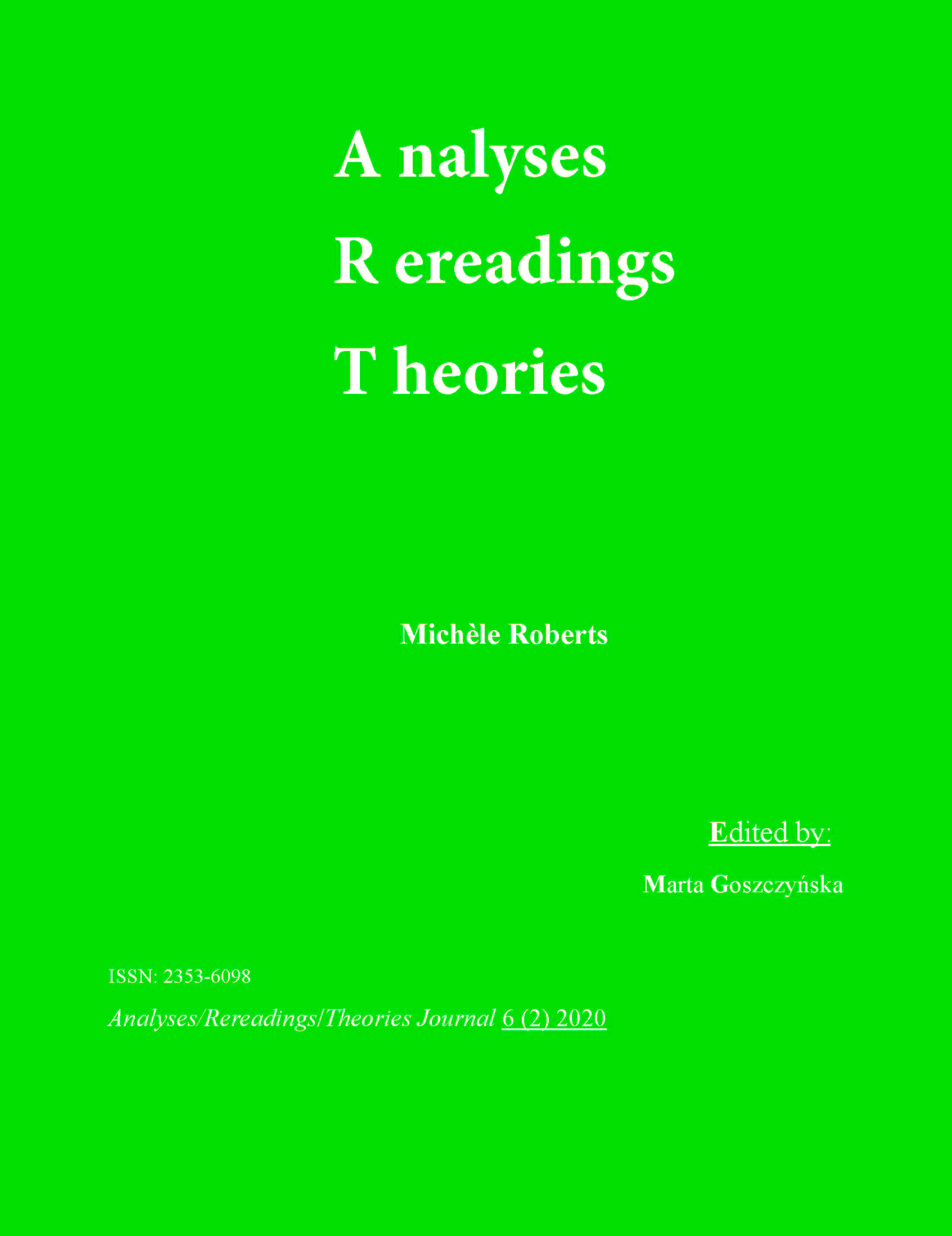Resisting the Oppressive Paternal Metaphor of God in Michèle Roberts’s "Impossible Saints"
DOI:
https://doi.org/10.18778/2353-6098.6.11Keywords:
Michèle Roberts, feminism, religion, Catholic Church, Julia Kristeva, Jacques LacanAbstract
The protagonist of Michèle Roberts’s Impossible Saints, Josephine, establishes a nonconformist convent for women who seek communion with God by following an unorthodox path of sensual spirituality. Impossible Saints intersperses Josephine’s story with a number of miniature narratives depicting fictional lives of saints, rewritten in a feminist manner, portraying both the female predicament in the patriarchally structured society and women’s struggle for empowerment in which they rebel against masculinist conventions. The article employs feminist thought, derived mainly from Julia Kristeva, to examine the way in which Roberts problematizes the relation of the Catholic Church to the position of women as well its concern with the human body. The bodily dimension of the divine, as proposed by Luce Irigaray, manifesting in the emancipatory communal experience of women in Josephine’s convent, greatly contrasts with the Catholic regulatory character of religiosity. The analysis also situates the patriarchal institution of the Church in the context of the Lacanian order of the symbolic and his notion of the Name-of-the-Father. It culminates in exploring the issue of the metaphor of God as seen through the traditional patriarchal frame which pictures God as masculine.
References
Bastida Rodríguez, Patricia. “Rethinking Female Sainthood: Michèle Roberts’ Spiritual Quest in Impossible Saints.” Feminist Theology 15.1 (2006): 70–83. https://doi.org/10.1177/0966735006068850
Google Scholar
DOI: https://doi.org/10.1177/0966735006068850
Beck, Richard. “Feeling Queasy About the Incarnation: Terror Management Theory, Death, and the Body of Jesus.” Journal of Psychology and Theology 36.4 (2008): 303–13. https://doi.org/10.1177/009164710803600406
Google Scholar
DOI: https://doi.org/10.1177/009164710803600406
Cain, Ruth. “The Buried Madonna: Matricide, Maternal Power and the Novels of Michèle Roberts.” Women’s Studies 42.4 (2013): 408–38. https://doi.org/10.1080/00497878.2013.772875
Google Scholar
DOI: https://doi.org/10.1080/00497878.2013.772875
Daly, Mary. Beyond God the Father: Toward a Philosophy of Women’s Liberation. Boston: Beacon, 1985.
Google Scholar
Falcus, Sarah. Michèle Roberts: Myths, Mothers and Memories. Bern: Lang, 2007.
Google Scholar
Hall, M. Elizabeth Lewis and Erik Thoennes. “At Home in Our Bodies: Implications of the Incarnation for Embodiment and Christian Higher Education.” Christian Scholar’s Review 36 (2006): 29–46.
Google Scholar
Homer, Sean. Jacques Lacan. London: Routledge, 2005. https://doi.org/10.4324/9780203347232
Google Scholar
DOI: https://doi.org/10.4324/9780203347232
Irigaray, Luce. An Ethics of Sexual Difference. Trans. Carolyn Burke and Gillian C. Gill. London: Continuum, 2004.
Google Scholar
Jacobson, Heather L., M. Elizabeth Lewis Hall, Tamara L. Anderson and Michele M. Willingham. “Temple or Prison: Religious Beliefs and Attitudes Toward the Body.” Journal of Religion and Health 55.6 (2016): 2154–73. https://doi.org/10.1007/s10943-016-0266-z
Google Scholar
DOI: https://doi.org/10.1007/s10943-016-0266-z
Joy, Morny. “Autonomy and Divinity: A Double-Edged Experiment.” Thinking with Irigaray. Ed. Mary C. Rawlinson, Sabrina L. Hom and Serene J. Khader. New York: State U of New York P, 2011. 221–45.
Google Scholar
Kristeva, Julia. The Kristeva Reader. Ed. Toril Moi. New York: Columbia UP, 1986.
Google Scholar
Lacan, Jacques. Écrits. Trans. Bruce Fink. New York: Norton, 2006.
Google Scholar
Lacan, Jacques. The Seminar of Jacques Lacan: Book VII: The Ethics of Psychoanalysis, 1959–1960. Ed. Jacques-Alain Miller. Trans. Dennis Porter. London: Routledge, 2008.
Google Scholar
Parker, Emma. “From House to Home: A Kristevan Reading of Michèle Roberts’s Daughters of the House.” Critique: Studies in Contemporary Fiction 41.2 (2000): 153–73. https://doi.org/10.1080/00111610009601584
Google Scholar
DOI: https://doi.org/10.1080/00111610009601584
Parker, Emma. “Sex Changes: The Politics of Pleasure in the Novels of Michèle Roberts.” Literature Interpretation Theory 17.3–4 (2006): 325–51. https://doi.org/10.1080/10436920601000336
Google Scholar
DOI: https://doi.org/10.1080/10436920601000336
Roberts, Michèle. Impossible Saints. London: Virago, 1998.
Google Scholar
Roberts, Michèle. “On Women, Christianity, and History.” Interview with Patricia Bastida Rodríguez. Atlantis 25.1 (2003): 93–107.
Google Scholar
Ruether, Rosemary Radford. “Sexism and Misogyny in the Christian Tradition: Liberating Alternatives.” Buddhist-Christian Studies 34 (2014): 83–94. https://doi.org/10.1353/bcs.2014.0020
Google Scholar
DOI: https://doi.org/10.1353/bcs.2014.0020
Published
How to Cite
Issue
Section
License

This work is licensed under a Creative Commons Attribution-NonCommercial-NoDerivatives 4.0 International License.









